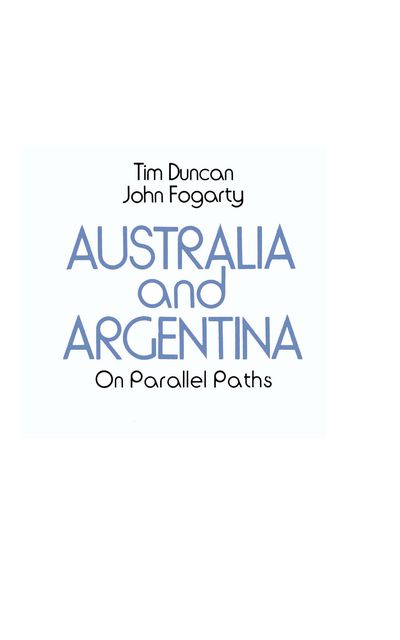Australia and Argentina
On Parallel Paths
Tim Duncan, John Fogarty
Paperback
Out of stock
$39.99
Member discount
As an MUP member you get 40% off the price of this book.
Member discount
As an MUP member you get 40% off the price of this book.
Member discount
As an MUP member you get 100% off the price of this book.
Member discount
As an MUP member you get 25% off the price of this book.
Member discount
As an MUP member you get 25% off the price of this book.
Member discount
As an MUP member you get 25% off the price of this book.
Member discount
As an MUP member you get 40% off the price of this book.
Member discount
As an MUP member you get 10% off the price of this book.
Member discount
As an MUP member you get 35% off the price of this book.
Member discount
As an MUP member you get 40% off the price of this book.
Australia and Argentina
On Parallel Paths
Tim Duncan, John Fogarty
First published in 1986, back in print
The sad story of post-war Argentina is a timely reminder that rich nations, badly managed, can gradually become poor.
Could an Argentine disaster take place in Australia? Twenty years ago few Australians would have given the idea serious attention. But for twenty years Australians have accepted the case for economic restructuring, only to find it almost beyond them to make it happen.
This is only the most recent experience Australia and Argentina share. The authors point to parallels extending back into the last century when European immigrants and capital flowed into both antipodean societies at the same time, for like reasons and with similar results. No other society shares so much of its economic history with Australia; we can ill afford to ignore the lessons of the Argentine tragedy.
Certain political characteristics have thus far held Australia back from Argentine extremes. But both countries have failed to industrialize efficiently, and…
Could an Argentine disaster take place in Australia? Twenty years ago few Australians would have given the idea serious attention. But for twenty years Australians have accepted the case for economic restructuring, only to find it almost beyond them to make it happen.
This is only the most recent experience Australia and Argentina share. The authors point to parallels extending back into the last century when European immigrants and capital flowed into both antipodean societies at the same time, for like reasons and with similar results. No other society shares so much of its economic history with Australia; we can ill afford to ignore the lessons of the Argentine tragedy.
Certain political characteristics have thus far held Australia back from Argentine extremes. But both countries have failed to industrialize efficiently, and…
The sad story of post-war Argentina is a timely reminder that rich nations, badly managed, can gradually become poor.
Could an Argentine disaster take place in Australia? Twenty years ago few Australians would have given the idea serious attention. But for twenty years Australians have accepted the case for economic restructuring, only to find it almost beyond them to make it happen.
This is only the most recent experience Australia and Argentina share. The authors point to parallels extending back into the last century when European immigrants and capital flowed into both antipodean societies at the same time, for like reasons and with similar results. No other society shares so much of its economic history with Australia; we can ill afford to ignore the lessons of the Argentine tragedy.
Certain political characteristics have thus far held Australia back from Argentine extremes. But both countries have failed to industrialize efficiently, and both economies still depend heavily upon politically hard-pressed primary industry. If Australia continues to subordinate the interests of its dynamic industries to those of the more politically influential sectors, in Argentine fashion, then—so runs the powerful argument of this book—Australia faces an Argentine future.
Could an Argentine disaster take place in Australia? Twenty years ago few Australians would have given the idea serious attention. But for twenty years Australians have accepted the case for economic restructuring, only to find it almost beyond them to make it happen.
This is only the most recent experience Australia and Argentina share. The authors point to parallels extending back into the last century when European immigrants and capital flowed into both antipodean societies at the same time, for like reasons and with similar results. No other society shares so much of its economic history with Australia; we can ill afford to ignore the lessons of the Argentine tragedy.
Certain political characteristics have thus far held Australia back from Argentine extremes. But both countries have failed to industrialize efficiently, and both economies still depend heavily upon politically hard-pressed primary industry. If Australia continues to subordinate the interests of its dynamic industries to those of the more politically influential sectors, in Argentine fashion, then—so runs the powerful argument of this book—Australia faces an Argentine future.
Paperback
Out of stock
$39.99
Member discount
As an MUP member you get 40% off the price of this book.
Member discount
As an MUP member you get 40% off the price of this book.
Member discount
As an MUP member you get 100% off the price of this book.
Member discount
As an MUP member you get 25% off the price of this book.
Member discount
As an MUP member you get 25% off the price of this book.
Member discount
As an MUP member you get 25% off the price of this book.
Member discount
As an MUP member you get 40% off the price of this book.
Member discount
As an MUP member you get 10% off the price of this book.
Member discount
As an MUP member you get 35% off the price of this book.
Member discount
As an MUP member you get 40% off the price of this book.





